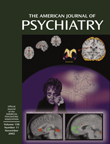Child Development Following Exposure to Tricyclic Antidepressants or Fluoxetine Throughout Fetal Life: A Prospective, Controlled Study
Abstract
OBJECTIVE: Previous work suggested that first-trimester exposure to tricyclic antidepressants or fluoxetine does not affect adversely child IQ and language development. However, many women need antidepressants throughout pregnancy to avoid morbidity and suicide attempts. Little is known about the fetal safety of tricyclic antidepressants and fluoxetine when taken throughout pregnancy. The goal of this study was to assess the effects of tricyclic antidepressants and fluoxetine used throughout gestation on child IQ, language, and behavior. METHOD: In a prospective study, mother-child pairs exposed throughout gestation to tricyclic antidepressants (N=46) or fluoxetine (N=40) and an unexposed, not depressed comparison group (N=36) were blindly assessed. The three groups were compared in terms of the children’s IQ, language, behavior, and temperament between ages 15 and 71 months. The authors adjusted for independent variables such as duration and severity of maternal depression, duration of pharmacological treatment, number of depression episodes after delivery, maternal IQ, socioeconomic status, cigarette smoking, and alcohol use. RESULTS: Neither tricyclic antidepressants nor fluoxetine adversely affected the child’s global IQ, language development, or behavior. IQ was significantly and negatively associated with duration of depression, whereas language was negatively associated with number of depression episodes after delivery. CONCLUSIONS: Exposure to tricyclic antidepressants or fluoxetine throughout gestation does not appear to adversely affect cognition, language development, or the temperament of preschool and early-school children. In contrast, mothers’ depression is associated with less cognitive and language achievement by their children. When needed, adequate antidepressant therapy should be instituted and maintained during pregnancy and postpartum.



